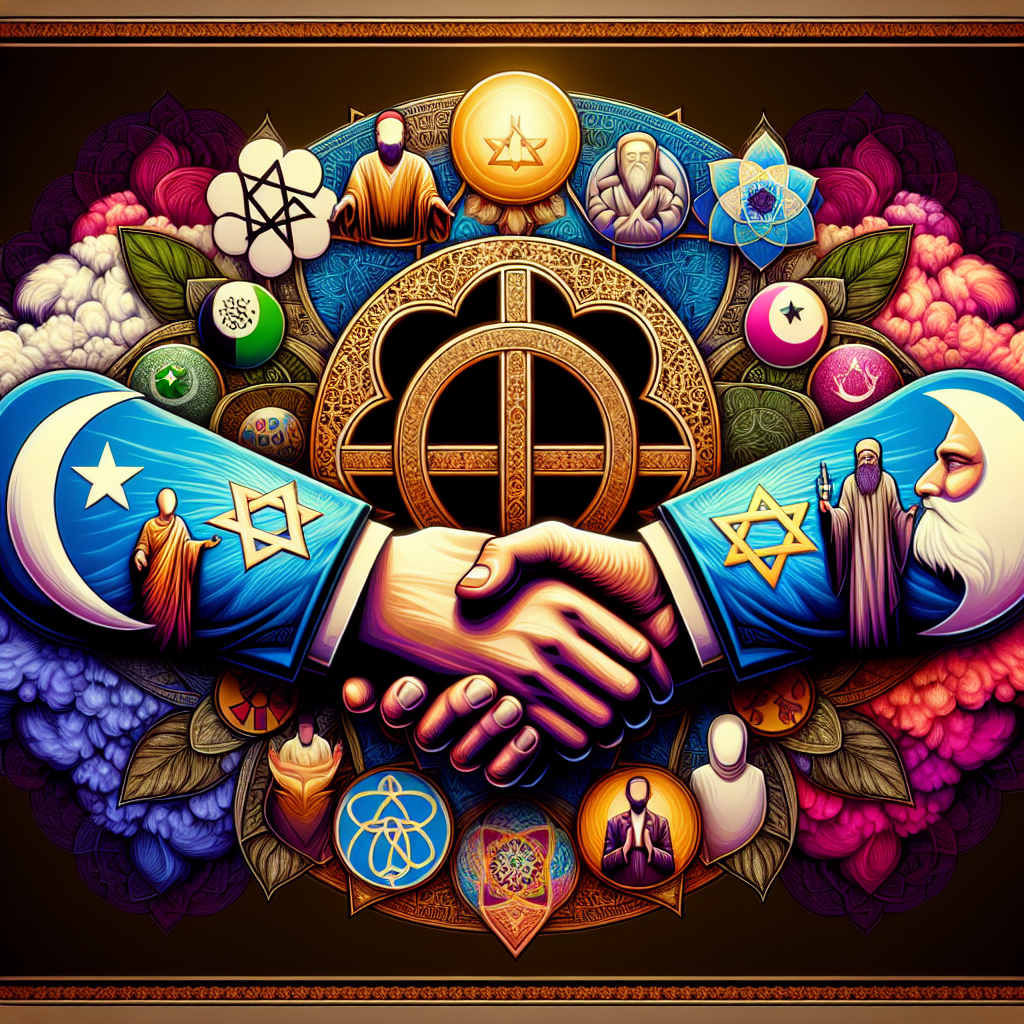“`html
The Role of Empathy in Interfaith Dialogue and Respect
In a world increasingly defined by diversity, the need for understanding and acceptance across different faiths has never been more crucial. The concept of interfaith dialogue transcends mere conversations; it embodies a commitment to building bridges between divergent beliefs, fostering a spirit of mutual respect and ultimately paving the way for spiritual unity. At the heart of this transformative process lies empathy, a powerful tool that can facilitate deeper connections between individuals of various faith traditions. In this article, we will explore the profound role of empathy in interfaith dialogue, discuss its implications for respect among different religions, and illustrate how it serves as a catalyst for spiritual unity.
Understanding Interfaith Dialogue
Interfaith dialogue can be defined as an engagement process where individuals or groups from different religious backgrounds communicate in order to understand one another better. It seeks to promote social harmony and mutual respect in a global landscape marked by religious conflicts and misunderstandings. By opening up avenues for sincere conversations, interfaith dialogue allows participants to share their beliefs, practices, and values in a safe environment.
In this context, empathy plays a pivotal role. When individuals approach discussions with an empathetic mindset, they are more likely to recognize and appreciate the perspectives of others. This understanding can lead to a breakdown of stereotypes and misconceptions that often fuel religious intolerance.
The Importance of Empathy in Fostering Respect
Respect is the cornerstone of any meaningful interaction, particularly in interfaith dialogue. Empathy nurtures respect by encouraging individuals to put themselves in the shoes of others, considering their feelings and experiences. This emotional resonance can lead to greater tolerance and appreciation for the rich tapestry of beliefs that exists within humanity.
Numerous studies have shown that empathetic interactions can reduce prejudice and promote prosocial behavior. For instance, research published in the journal Psychological Bulletin indicates that empathy training can lead to improved attitudes toward marginalized groups. Applying these findings to the realm of interfaith dialogue, it becomes evident that fostering empathy can mitigate biases against different religious practices and beliefs.
Building Empathy through Shared Experiences
One effective way to cultivate empathy is by sharing personal stories and experiences. In interfaith dialogue, inviting participants to recount their journeys can humanize abstract beliefs, allowing others to see the individuals behind the faith. For example, a Christian and a Muslim may both share stories of love, loss, and hope. Through these shared experiences, they can find common ground, which in turn enhances mutual respect.
Moreover, community service projects that involve members of different faiths can further solidify these bonds. Engaging in acts of kindness and charity together not only fosters interpersonal connections but also underscores the universal values that exist across faith traditions, such as compassion and service to others.
Empathy as a Catalyst for Spiritual Unity
The ultimate goal of interfaith dialogue is not merely coexistence but genuine spiritual unity. Empathy acts as a catalyst for this unity by highlighting the interconnectedness of all human beings. When individuals recognize that their struggles and aspirations transcend religious boundaries, they are more likely to work together toward a common goal.
By fostering empathy, religious leaders and community members can initiate discussions that promote deeper understanding and joint efforts in addressing shared challenges, such as poverty, discrimination, and environmental issues. This collaborative spirit can lead to transformative social change, driven by the recognition that our differences can enrich our communities rather than divide them.
Challenges and Misconceptions about Empathy in Interfaith Dialogue
Despite its power, there are challenges to integrating empathy into interfaith dialogue. One common misconception is that empathy requires compromising one’s beliefs. However, true empathy does not necessitate a dilution of faith; rather, it invites individuals to acknowledge and respect the beliefs of others while holding firm to their own.
Additionally, some may fear that open dialogue could lead to conflict or misunderstanding. However, studies, such as those reported by Teaching Tolerance, have shown that structured dialogues, facilitated by empathetic leaders, can lead to constructive discussions, even on contentious issues.
Checklist for Fostering Empathy in Interfaith Dialogue
- Engage in active listening during conversations.
- Share personal stories to foster connections.
- Participate in community service projects together.
- Be open to different perspectives without judgment.
- Encourage questions to clarify misunderstandings.
- Celebrate shared values and experiences.
Practical Steps to Enhance Empathy
Cultivating empathy within the context of interfaith dialogue involves both individual and collective efforts. Here are some practical steps organizations and individuals can take:
| Action | Description | Benefits |
| Organize Workshops | Facilitate training on empathy skills and active listening. | Enhances understanding and reduces biases. |
| Host Interfaith Events | Bring together diverse religious groups for dialogue and shared activities. | Fosters relationships and community building. |
| Incorporate Technology | Use social media platforms to share stories and experiences across faiths. | Broadens reach and engages younger audiences. |
Tendencies and Future Directions in Interfaith Dialogue
As society continues to evolve, so too does the landscape of interfaith dialogue. The advent of technology has made it easier for individuals to connect with others from different backgrounds, breaking down geographical barriers. Virtual platforms allow for discussions and collaborations that were previously unimaginable, enabling a broader scope of shared experiences and dialogues.
Moreover, as global issues such as climate change and social inequality increasingly require unified action, spiritual unity across faiths becomes more pertinent. Future interfaith dialogues may increasingly focus on shared moral imperatives, such as humanitarian efforts and environmental sustainability, guided by the empathetic understanding of diverse perspectives.
Frequently Asked Questions (FAQs)
What is interfaith dialogue?
Interfaith dialogue is a process where individuals or groups from different religious backgrounds engage in discussions to enhance mutual understanding and respect.
How can empathy improve interfaith dialogue?
Empathy allows participants to understand different perspectives, fostering respect and reducing biases and misconceptions.
Can empathy exist without compromising personal beliefs?
Yes, empathy does not require compromising one’s beliefs; rather, it encourages respectful acknowledgment of differing views.
What role do personal stories play in fostering empathy?
Sharing personal stories helps humanize abstract beliefs, allowing for emotional connection and deeper understanding among participants.
How can technology facilitate interfaith dialogue?
Technology enables broader connections, allowing individuals to share experiences and engage in discussions regardless of geographical barriers.
What are some effective activities for promoting interfaith understanding?
Community service, workshops, and shared cultural events are effective activities that promote interaction and understanding across faiths.
How can I get involved in interfaith dialogue in my community?
Seek local interfaith organizations or groups, participate in events, or start a dialogue group to encourage community engagement.
Conclusion
The pursuit of empathy within interfaith dialogue is not just a noble endeavor; it is a necessity in our increasingly divided world. By fostering understanding and respect, we take substantial steps toward creating a more harmonious global community. As individuals engage in this process, they contribute to a broader movement toward spiritual unity, one where diverse beliefs and backgrounds are celebrated rather than merely tolerated. It is time to harness the power of empathy to transform our dialogues, foster respect, and promote a future defined by connection rather than division.
As we move forward, let us apply the principles discussed in this article in our own lives. By actively engaging in interfaith dialogue and fostering empathy, we can all play a role in promoting a world united in respect and spiritual understanding.
“`

